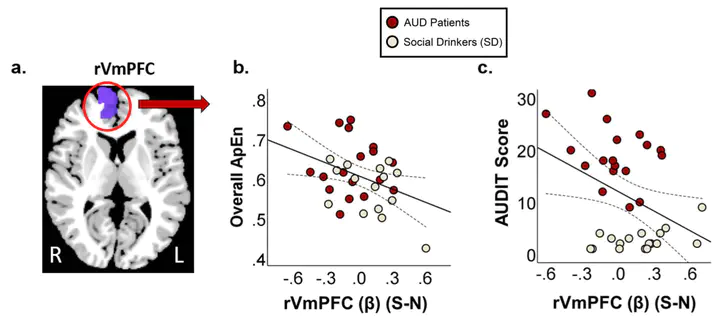Irregular Autonomic Modulation Predicts Risky Drinking and Altered Ventromedial Prefrontal Cortex Response to Stress in Alcohol Use Disorder

Abstract
Autonomic dysfunction has been associated with risky drinking and alcohol use disorder (AUD). Although autonomic nervous system (ANS) activity has been attributed to the ventromedial prefrontal cortex (VmPFC)-limbic-striatal regions, the specific role of ANS disruption in AUD and its association with these regions remain unclear. Using functional magnetic resonance imaging (fMRI) and concurrent electrocardiogram (ECG), the current study examined neural correlates of ANS activity in AUD and its role in AUD pathology. Demographically matched 20 AUD patients and 20 social drinkers (SD) completed an fMRI task involving repeated exposure to stress, alcohol-cue and neutral-relaxing images in a block design. Based on the known VmPFC-limbic-striatal functions involved in emotions, reward and the ANS, we performed a regions of interest (ROI) analysis to examine the associations between ANS activity and neural responses in the VmPFC, amygdala, and ventral striatum. Across conditions, AUD patients showed significantly higher levels of overall heart rate (HR) and approximate entropy (ApEn) compared to SD (Ps<0.05). In all participants, increased HR was associated with greater drinking volume (P < 0.05). In addition, higher ApEn levels were associated with greater drinking volume (P < 0.05) and decreased right VmPFC response to stress (P < 0.05). Our findings demonstrate ANS disruption in AUD indexed by high overall HR and ApEn. The association between ApEn and rVmPFC response suggests that ApEn may play a role in modulating drinking via interactions with neural regions of emotion regulation. These findings provide insight into patterns of ANS disruption and their relevance to AUD pathology.